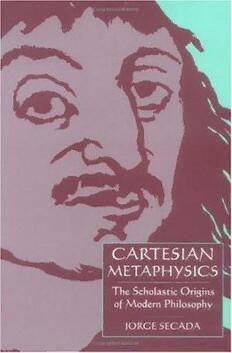
Cartesian Metaphysics: The Scholastic Origins of Modern Philosophy PDF
Preview Cartesian Metaphysics: The Scholastic Origins of Modern Philosophy
Cartesian Metaphysics This is the first book-length study of Descartes’s metaphysics to place it in its immediate historical context, the Late Scholastic philosophy of thinkers such as Suárez against which Descartes reacted. Jorge Secada views Cartesian philosophy as an ‘essentialist’ reply to the ‘existentialism’ of the School, and his discussion includes careful analyses and original interpretations of such central Cartesian themes as the role of scepticism, intentionality and the doctrine of the material falsity of ideas, universals and the relation between sense and understanding, causation and the proofs of the existence of God, the theory of substance, and the dualism of mind and matter. His study offers a picture of Descartes’s metaphysics that is both novel and philosophically illuminating. Jorge Secada is Associate Professor of Philosophy at the University of Virginia. He has published a number of articles on the history of early modern philosophy. This page intentionally left blank Cartesian Metaphysics The Late Scholastic Origins of Modern Philosophy Jorge Secada University of Virginia PUBLISHED BY CAMBRIDGE UNIVERSITY PRESS (VIRTUAL PUBLISHING) FOR AND ON BEHALF OF THE PRESS SYNDICATE OF THE UNIVERSITY OF CAMBRIDGE The Pitt Building, Trumpington Street, Cambridge CB2 IRP 40 West 20th Street, New York, NY 10011-4211, USA 477 Williamstown Road, Port Melbourne, VIC 3207, Australia http://www.cambridge.org ' Cambridge University Press 2000 This edition ' Cambridge University Press (Virtual Publishing) 2003 First published in printed format 2000 A catalogue record for the original printed book is available from the British Library and from the Library of Congress Original ISBN 0 521 45291 0 hardback ISBN 0 511 01312 4 virtual (netLibrary Edition) In memory of Carmen Koechlin Meyans, Narda Koechlin Meyans and Carlos Secada Mas There is no life in thee, no, except that rocking life imparted by a gently rolling ship; by her, borrowed from the sea; by the sea, from the inscrutable tides of God. But while this sleep, this dream is on ye, move your foot or hand an inch; slip your hold at all; and your identity comes back in horror. Over Descartian vortices you hover. H. Melville Contents Preface page ix Abbreviations xii Prologue 1 Part I The unity of Cartesian metaphysics 1 Descartes’s essentialist metaphysics 7 2 Scepticism, Scholasticism and the origins of Descartes’s philosophy 27 3 Cartesian real essences 55 Part II Ideas and the road from essence to existence 4 Ideas and the world in the mind 77 5 My wax, my intellect and I 115 6 Essentialism and the existence of God 148 Part III Cartesian substances 7 The substantial tension 183 8 The essence and the existence of Cartesian substances 205 9 The real distinction or the body and the minds 236 Epilogue 265 References 307 Index 323 This page intentionally left blank Preface I began writing this book about twelve years ago, after finally abandoning the revision of my doctoral dissertation and deciding to instead start anew and write a fresh account of the Cartesian metaphysics. I had basically finished what you now have in your hands by 1994. At that point I still thought that it would contain a fourth part exploring the origins and development of ideal- ism. However, I have recently come to realize that the present essay is com- plete as it stands and that that final part is in fact an independent project which will see the light in its own time. In writing this essay I have incurred many debts, too many to recall and properly acknowledge here. I beg the forgiveness of those institutions or persons to whom I am obliged but whom I have failed to mention. Some of the research which I did in the early eighties has found its way into this essay particularly in chapters 7 and 8. I thank the generosity and kindness of the Master and Fellows of St John’s College, Cambridge for the opportunity to carry it out in a most congenial and intellectually stimulating environment. Some sections of chapter 5 were written in one of the most beautiful urban settings in the world while on a visiting appointment at the University of British Columbia in the autumn of 1991; I thank the Philosophy Department there, and especially Paul Russell, for that opportunity. Some other parts, particularly in chapters 1 and 3, were composed in Quito in 1993; I thank FLACSO-Ecuador and my good friends Alonso Zarzar and Heraclio Bonilla for making that wonderful time up in the Andes possible. Preparation of the final production copy took place while on a most enjoyable NEH appointment at Potsdam College of SUNY; I thank all who had a hand in bring- ing about that visit, particularly Joseph DiGiovanna and Philip Tartaglia. I also wish to thank my numerous friends at the Departamento de Humanidades of the Pontificia Universidad Católica del Perú for selflessly providing me over the years with the facilities with which to carry out my work while in Lima. Finally, I thank the O’Reilly Memorial Library of Christendom College at Fort Royal in Virginia for allowing me to consult their rare books collection. The Corcoran Department of Philosophy and the College of Arts and Sciences at the University of Virginia have given me invaluable encour- ix
